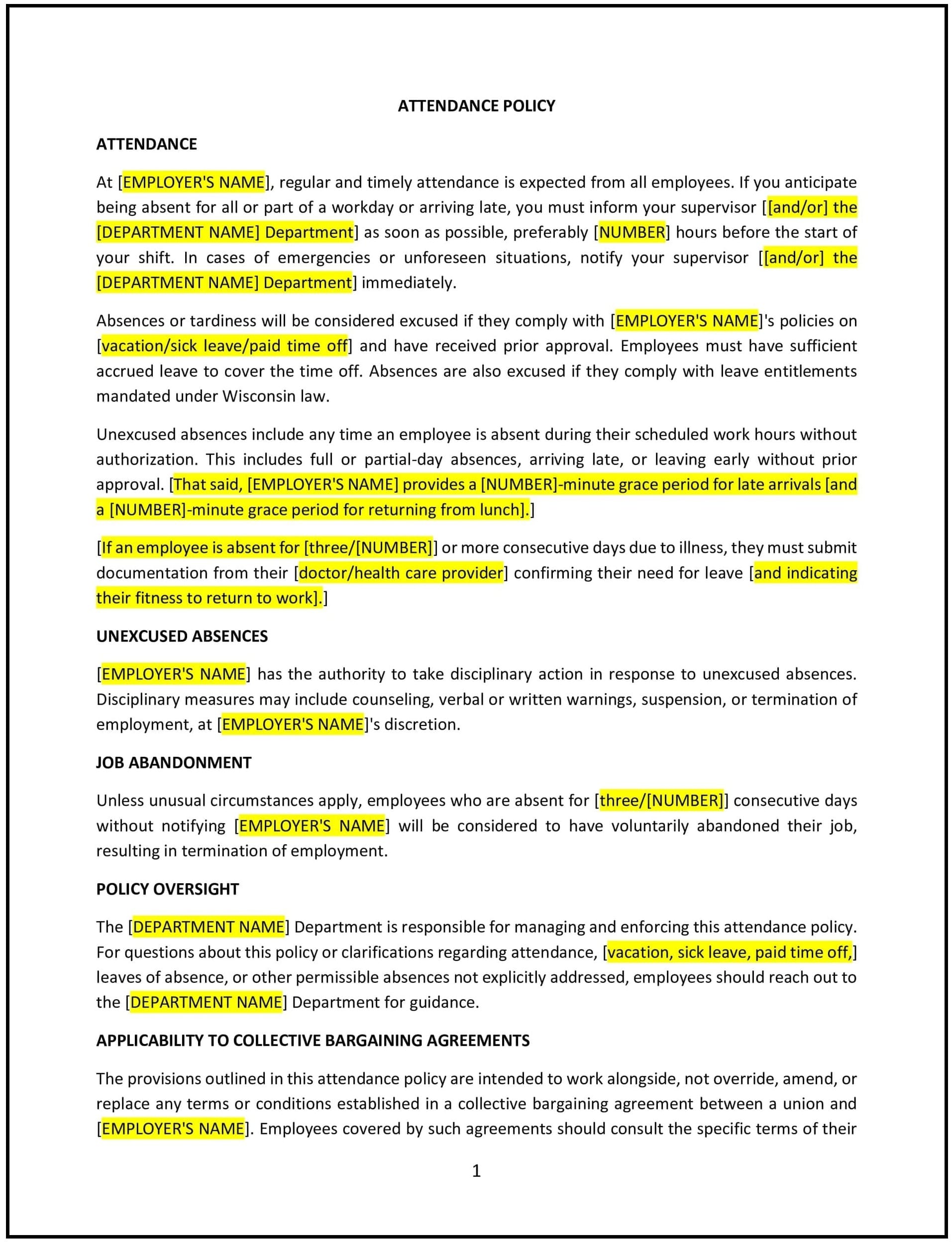Got contracts to review? While you're here for policies, let Cobrief make contract review effortless—start your free review now.

Customize this template for free
Attendance policy (Wisconsin)
An attendance policy helps Wisconsin businesses set clear expectations for employee attendance, including punctuality, absence reporting, and the handling of various types of leave. This policy outlines the company's approach to managing attendance, addressing unexcused absences, and providing guidance on the proper procedures for requesting time off in accordance with state laws.
By implementing this policy, businesses can improve workplace productivity, reduce absenteeism, and ensure that employees understand their responsibilities and rights related to attendance.
How to use this attendance policy (Wisconsin)
- Define attendance expectations: Specify the company's expectations for employee attendance, including the importance of punctuality and reliability, and clarify how absences should be reported.
- Set procedures for requesting time off: Outline the process employees should follow to request time off, including how far in advance requests should be made, how to submit requests (e.g., forms, email), and who to contact for approval.
- Address paid and unpaid leave: Clarify the company's policy on paid and unpaid leave, including vacation days, sick leave, and personal leave. Specify any eligibility requirements and accrual methods for leave.
- Define excused vs. unexcused absences: Explain what constitutes an excused absence (e.g., illness, emergency, approved time off) and what constitutes an unexcused absence, including any disciplinary actions for unexcused absences.
- Outline attendance tracking: Specify how attendance will be tracked, whether through timekeeping systems, reports, or supervisor oversight, and how absences will be documented.
- Address tardiness: Clearly state the company's expectations around tardiness, including when an employee is considered late, how repeated tardiness will be addressed, and the potential consequences for consistent lateness.
- Clarify consequences of excessive absenteeism: Define what constitutes excessive absenteeism and the potential disciplinary actions, including verbal warnings, written warnings, or termination.
- Accommodate special circumstances: Include provisions for accommodations for employees who may need time off for health or family-related reasons in accordance with Wisconsin law and federal laws like the FMLA (Family and Medical Leave Act).
Benefits of using this attendance policy (Wisconsin)
This policy offers several benefits for Wisconsin businesses:
- Increases productivity: By setting clear attendance expectations and managing absenteeism, the policy helps maintain a productive and efficient workforce.
- Reduces absenteeism: Clear guidelines for reporting absences and consequences for excessive absenteeism encourage employees to attend work regularly.
- Improves fairness: The policy ensures that all employees are held to the same standards, creating a fair and consistent approach to attendance management.
- Promotes legal compliance: The policy helps businesses comply with Wisconsin’s employment laws, including rules around paid sick leave, family leave, and other legal requirements related to attendance.
- Promotes employee accountability: By defining attendance expectations and consequences, the policy encourages employees to be more accountable for their attendance and punctuality.
Tips for using this attendance policy (Wisconsin)
- Communicate the policy clearly: Ensure all employees understand the attendance expectations, reporting procedures, and the consequences for excessive absenteeism.
- Monitor attendance regularly: Track attendance patterns to identify any issues early on, and address them with employees to prevent continued absenteeism.
- Offer flexibility: Consider offering flexible work arrangements or accommodations for employees who have legitimate reasons for needing time off, such as medical issues or family emergencies.
- Be consistent: Apply the policy consistently to all employees, ensuring that attendance-related consequences are fair and appropriate.
- Review periodically: Regularly review and update the policy to reflect changes in Wisconsin laws or company practices, and ensure it remains effective and compliant.